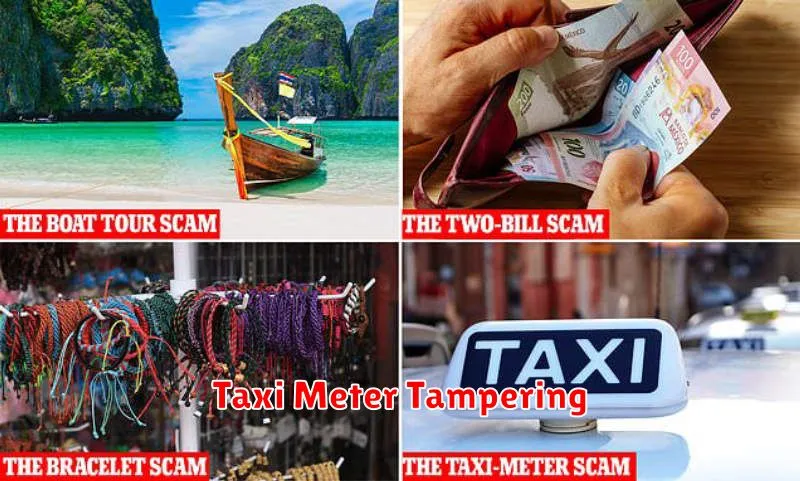Traveling the world can be an enriching experience, filled with unforgettable memories. However, amidst the excitement and wonder, it’s crucial to remain vigilant against tourist scams. Sadly, unsuspecting travelers often fall prey to these schemes, which can range from petty theft to elaborate cons. This article will explore the 10 most common tourist scams in the world, providing valuable insights to help you stay safe and protect yourself from becoming a victim. Understanding these common travel scams can empower you to navigate your journeys with confidence and avoid unnecessary financial loss or emotional distress. From pickpocketing to fake police officers, we’ll delve into the tactics employed by scammers and offer practical tips on how to recognize and avoid them. Whether you’re a seasoned traveler or embarking on your first international adventure, being aware of these common scams is essential for a smooth and enjoyable trip.
Protecting yourself from tourist scams is a vital aspect of responsible travel. By familiarizing yourself with the most common travel scams, you can significantly reduce your risk of being targeted. This article aims to equip you with the knowledge and tools you need to stay one step ahead of potential scammers. We’ll explore 10 common scams that tourists encounter around the globe, from the bustling streets of major cities to remote tourist destinations. Learn how to identify the red flags, understand the typical approaches used by scammers, and develop strategies for staying safe. By being proactive and informed, you can enjoy your travels with peace of mind, knowing you’re well-prepared to handle potential tourist scams effectively.
Why Tourists Are Targeted
Tourists are often prime targets for scams due to a few key factors. They are typically unfamiliar with their surroundings, local customs, and laws, making them more vulnerable to manipulation. Lack of local language proficiency can also create communication barriers that scammers exploit. Additionally, tourists often carry more cash and valuables than locals, presenting a tempting opportunity for theft.
Another significant factor is the limited time tourists have in a destination. This urgency can make them rush decisions, overlook red flags, and be less likely to report minor incidents to authorities. Scammers capitalize on this time constraint, knowing that tourists are often eager to move on to the next experience.
Finally, the perception of wealth associated with tourists makes them attractive targets. Even budget travelers might be perceived as wealthier than local residents, leading scammers to believe they have more to lose and are thus easier to intimidate or deceive.
Scam Patterns to Recognize
Being aware of common scam patterns can help you avoid becoming a victim. Many scams, despite their unique presentation, share underlying tactics. Recognizing these patterns is your first line of defense.
Distraction and Teamwork
Many scams involve distraction. One person diverts your attention while an accomplice commits the theft. This can range from someone bumping into you to staged arguments or even helpful strangers offering unsolicited assistance.
The Overly Friendly Stranger
Be wary of overly friendly strangers who approach you uninvited. They may offer to take your picture, guide you to a specific location, or involve you in a seemingly harmless game. These friendly overtures can be a prelude to a scam.
Creating a Sense of Urgency
Scammers often create a sense of urgency to pressure you into making quick decisions. This can involve limited-time offers, incredible deals that seem too good to be true, or claims of an emergency requiring immediate action.
Targeting Tourists
Tourists are often targeted because they are unfamiliar with the local customs and language. Scammers may exploit this by offering inflated prices, counterfeit goods, or fake tours.
Fake Police Officers

This scam involves imposters posing as police officers. They often target tourists, claiming they need to check for counterfeit money or illegal substances. They may ask to see your passport and wallet, and in the process, steal your cash or valuables.
Key Indicators of a Scam:
- Plain clothes: Real police officers in most countries will be in uniform. Be wary of anyone in plain clothes claiming to be police.
- Request for money: Police officers will never ask for money directly. This is a major red flag.
- Unusual locations: Be suspicious if they ask you to go somewhere secluded or private to conduct a “search.”
How to Avoid: Ask for official identification. If unsure, suggest going to the nearest police station to verify their identities. Do not hand over your passport or wallet directly; instead, show it briefly while keeping it in your possession. If you feel threatened, attract attention to yourself by shouting or calling for help.
Friendship Bracelet Scam

This scam preys on tourists’ good nature and desire for a unique cultural experience. A seemingly friendly local approaches, often in a busy tourist area, and engages in conversation. They may compliment your attire or ask about your travels. Their ultimate goal, however, is to tie a “friendship bracelet” around your wrist.
Once the bracelet is on, they demand payment, often an exorbitant amount. They may become aggressive or create a scene if you refuse. Sometimes, accomplices join in to intimidate the victim into paying. Even if you try to remove the bracelet, they may prevent you or claim it’s already been “gifted” and thus payment is required.
Prevention: Politely but firmly decline any offers of free bracelets or items. Avoid prolonged interactions with street vendors who appear overly eager to engage. If someone attempts to tie a bracelet on you, move your hand away and walk away quickly.
Taxi Meter Tampering

Taxi meter tampering is a common scam targeting tourists worldwide. Unscrupulous drivers manipulate the meter to inflate the fare, leaving unsuspecting passengers with an unjustly high bill.
This can take several forms. Some drivers might use a “turbo meter” that runs faster than normal. Others may simply start the meter at an inflated price. Still others may take unnecessarily long routes, increasing the final fare.
How to Avoid:
- Negotiate the fare upfront whenever possible, especially in countries where meters aren’t always used.
- Use reputable ride-hailing apps or pre-booked taxi services.
- Be aware of the typical fare for your journey. Research beforehand or ask your hotel for an estimate.
- If you suspect tampering, note the taxi number and driver’s details and report it to the local authorities.
Overpriced Souvenirs

One of the most prevalent tourist traps worldwide involves inflated prices for souvenirs. Vendors often capitalize on a tourist’s unfamiliarity with local prices to charge exorbitant amounts for trinkets, clothing, and other memorabilia. Negotiation is often key in these situations, but it’s crucial to be aware of a fair price range beforehand. Researching typical costs or visiting shops frequented by locals can help you avoid being overcharged.
Common tactics include strategically placed stalls near popular tourist attractions, creating a sense of urgency, or employing high-pressure sales tactics. Be wary of these tactics and don’t feel obligated to purchase anything you deem too expensive.
Tips to avoid this scam:
- Compare prices at multiple shops.
- Learn basic bargaining skills.
- Walk away if you feel pressured.
- Consider purchasing souvenirs from local markets or less touristy areas.
ATM Card Cloning

ATM card cloning involves thieves creating a duplicate of your ATM card. They do this by installing a skimmer device on the card slot of a legitimate ATM. This skimmer reads and stores the information encoded on your card’s magnetic stripe.
Simultaneously, a hidden camera or a fake keypad overlay records your PIN as you enter it. With both your card information and PIN, criminals can easily create a clone and drain your account.
How to protect yourself:
- Inspect the ATM: Look for anything unusual or loose on the card slot or keypad.
- Cover the keypad: Shield your hand when entering your PIN to prevent hidden cameras from recording it.
- Use ATMs inside banks: These are generally more secure than standalone ATMs.
- Monitor your accounts: Regularly check your bank statements for any unauthorized transactions.
Hotel Booking Switch
The hotel booking switch is a particularly frustrating scam that preys on travelers seeking affordable accommodations. You book a room online, often through a third-party website, at an attractively low price. Upon arrival, you discover the hotel is either fully booked, of significantly lower quality than advertised, or located in a less desirable area. The scammer then offers you a “comparable” room at a much higher price, banking on your desperation and exhaustion after your journey.
Key indicators of this scam include unusually low prices, requests for upfront payment through non-secure methods, and websites with limited contact information or vague terms and conditions. Protect yourself by booking directly with reputable hotels or well-established travel agencies, scrutinizing website details, and confirming your booking directly with the hotel before arrival.
Street Performer Distractions
Street performers, while often entertaining, can also be a source of distraction used in tourist scams. Pickpockets often work in teams, with some members creating a spectacle to draw a crowd’s attention. While onlookers are captivated, other members of the team move through the audience, lifting wallets, phones, and other valuables.
These distractions can take many forms. Elaborate musical performances, staged fights, or even seemingly spontaneous acts of kindness are all common tactics. The key is to create a diversion that occupies tourists’ attention and reduces their awareness of their surroundings. Crowded areas are particularly vulnerable to this type of scam, as the jostling and general commotion make it easier for pickpockets to operate undetected.
Rental Vehicle Damage Scams

Rental vehicle damage scams are prevalent worldwide, targeting unsuspecting tourists. Pre-existing damage is often blamed on the renter, leading to exorbitant repair fees. Scammers may fabricate damage or inflate the cost of minor repairs.
Thorough vehicle inspections before accepting the rental are crucial. Document every scratch, dent, or existing damage with photos and videos, ideally in the presence of a rental agency employee. If possible, have the agent sign off on the documented damage.
Understand your rental agreement thoroughly, paying attention to insurance coverage and liability. Be wary of pushy sales tactics for additional insurance. If damage is discovered upon return, refuse to sign anything until you fully understand the charges and have independently documented the damage. If you suspect a scam, contact your credit card company (if you used one for the rental) and consider legal advice.
Free Gift then Demand
This scam preys on the element of surprise and an inherent discomfort in refusing a “gift.” Someone, often appearing friendly and welcoming, will offer you something for free – a bracelet, a sprig of rosemary, a CD. Once you accept it, the tone shifts dramatically. They then aggressively demand payment, often creating a scene or using intimidation tactics to get you to hand over money. This scam is particularly common in major tourist areas and near popular attractions.
The best way to avoid this is to politely but firmly refuse anything offered for free from strangers. Do not engage in conversation and continue walking. If you’ve already accepted the item, and they demand payment, hand it back immediately and walk away. Do not be afraid to be assertive and draw attention to the situation if necessary.

